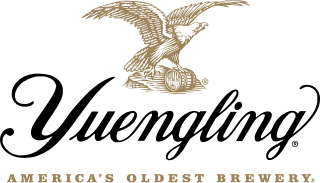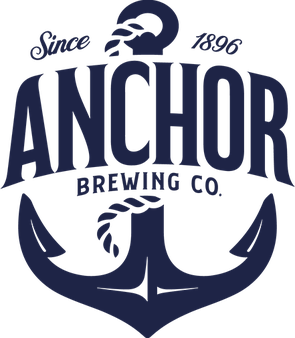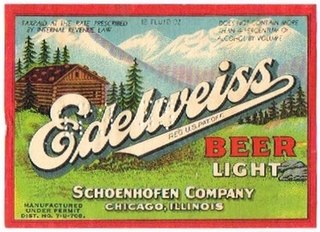
D. G. Yuengling & Son, established in 1829, is the oldest operating brewing company in the United States. In 2018, by volume of sales, it was the largest craft brewery, sixth largest overall brewery and largest wholly American-owned brewery in the United States. Its headquarters are in Pottsville, Pennsylvania. In 2015, Yuengling produced about 2.9 million barrels, operating two Pennsylvania facilities and a brewery in Tampa, Florida.

Pale lager is a pale-to-golden lager beer with a well-attenuated body and a varying degree of noble hop bitterness.

Joseph Schlitz Brewing Company is an American brewery based in Milwaukee, Wisconsin, and was once the largest producer of beer in the United States. Its namesake beer, Schlitz, was known as "The beer that made Milwaukee famous" and was advertised with the slogan "When you're out of Schlitz, you're out of beer". Schlitz first became the largest beer producer in the US in 1902 and enjoyed that status at several points during the first half of the 20th century, exchanging the title with Anheuser-Busch multiple times during the 1950s.

Anchor Brewing Company was a brewery on Potrero Hill in San Francisco, California. Founded in 1896, the brewery underwent several changes in location and ownership throughout its history. After years of declining sales due to competition with larger breweries, Anchor was purchased by Frederick Louis “Fritz” Maytag III in 1965, preventing its closure. The brewery operated at its Potrero Hill location from 1979 and was one of the last remaining producers of steam beer, a variety of beer trademarked by the company.

Sprecher Brewery is a brewery in Glendale, Wisconsin, U.S. It was founded in 1985 in Milwaukee by Randal Sprecher, and is Milwaukee's first craft brewery since Prohibition. Sprecher produces an assortment of beers, flavored malt beverages, and craft sodas, and it is famous for its root beer.

The Pabst Brewing Company is an American company that dates its origins to a brewing company founded in 1844 by Jacob Best and was, by 1889, named after Frederick Pabst. It outsources the brewing of over two dozen brands of beer and malt liquor. These include its own flagship Pabst Blue Ribbon, as well as brands from many defunct breweries.

Spoetzl Brewery is a brewery located in Shiner, Texas, United States. It produces a diverse line of Shiner beers, including their flagship Shiner Bock, a dark lager that is now distributed throughout the US. The brewery is owned by the Gambrinus Company, a family-owned company based in San Antonio, which also owns Trumer Brewery in Berkeley, California.

In the United States, beer is manufactured in breweries which range in size from industry giants to brew pubs and microbreweries. The United States produced 196 million barrels (23.0 GL) of beer in 2012, and consumes roughly 28 US gallons (110 L) of beer per capita annually. In 2011, the United States was ranked fifteenth in the world in per capita consumption, while total consumption was second only to China.

Genesee Brewing Company is an American brewery located along the Genesee River in Rochester, New York. From 2000 to 2009, the company was known as the High Falls Brewing Company. In 2009, High Falls was acquired by the capital investment firm KPS Capital. Together with newly acquired Labatt USA, KPS merged the two companies as North American Breweries. Along with this change, High Falls Brewery changed its name back to the original "Genesee Brewing Company" operating under the North American Breweries name. In October 2012, North American Breweries was purchased by FIFCO.

Lion Brewery, Inc, is the operator of the Lion Brewery, located in Wilkes-Barre, Pennsylvania, which was founded in 1905. A "heritage brewery", it is one of only 10 United States pre-Prohibition breweries that has independently and continuously operated since the repeal of Prohibition. It produces beers under its own Lionshead brand, and contract brews beer for other companies.

The G. Heileman Brewing Company of La Crosse, Wisconsin, United States, was a brewer that operated from 1858 to 1996. It was ultimately acquired by Stroh's. From 1872 until its acquisition, the brewery bore the family name of its co-founder and brewer Gottlieb Heileman.
Hudepohl Brewing Company is a brewery established in Cincinnati, Ohio in 1885 by founder Ludwig Hudepohl II. Hudepohl was the son of Ludwig Hudepohl who emigrated from Malgarten, Kingdom of Hannover, in 1838. Ludwig II had worked in the surgical tool business before starting his brewery. Hudepohl combined with Schoenling Brewing Company in 1986. Today, the Hudepohl-Schoenling Brewing Company is a wholly owned subsidiary of Christian Moerlein Brewing Company.

The Christian Schmidt Brewing Company was an American brewing company headquartered in Philadelphia, Pennsylvania. Founded in 1860, it was the largest brewing company in the history of Philadelphia, producing nearly 4,000,000 barrels of beer a year in the late 1970s. When it closed in 1987, it marked the first time in over 300 years that there was no brewery operating in Philadelphia.
Tractor Brewing Company is a New Mexico–based brewery, founded in 1999 in Los Lunas and since 2014 located in Albuquerque. Tractor beers have won awards at the New Mexico State Fair Pro-Am Competition.
Christian Heurich was an American brewer and real estate investor in Washington D.C. His company, Christian Heurich Brewing Company, established in 1872, was the largest brewery in Washington, D.C. At one point, Heurich owned more land than any other landowner in Washington, D.C., except the federal government.
The Nashville Brewing Company originally operated from 1859 to 1890 in Nashville, Tennessee. It was later renamed the Gerst Brewing Company and operated until 1954. The brewery was revived in 2016 by beer historian Scott R. Mertie, who had written a history of the Nashville brewing industry a decade earlier.
The Independent Milwaukee Brewery was an American brewery that was located on the south side of Milwaukee, Wisconsin from 1901 until 1964, when it was closed by G. Heileman Brewing Company which purchased the brewery in 1962. The brewery's signature brand was Braumeister. The trademark for this brand is currently held by Rhinelander Brewing Company.

The Peter Hand Brewing Company was an American brewery established in 1891 by Prussian immigrant and American Civil War veteran Peter Hand in Chicago, Illinois. The company is notable for popularizing the light beer recipe it would later sell to Miller Brewing, which thereafter rebranded it "Light Beer from Miller", and, ultimately, Miller Lite. When the brewery closed in 1978, it was the last brewing company in Chicago, until Sieben's River North opened in 1987.

The Peter Schoenhofen Brewing Company was an American brewery established in 1861 by Peter Schoenhofen and Matheus Gottfried in the Pilsen neighborhood of Chicago, Illinois. The company is notable for producing and selling the popular Edelweiss brand of American beer and the Green River brand soft drink.
The city of Rochester, New York—before being known as the birthplace of Kodak, Xerox, and Bausch & Lomb—was internationally known for its robust brewing industry. Indeed, the city was uniquely positioned for such an industry in the early 19th century. The corn, rye, barley, wheat, and other grains grown in the Genesee River Valley were shipped down river to be milled in such quantity that by 1838 Rochester was world's largest flour producer, earning it the nickname the Flour City.
















